-
 Bitcoin
Bitcoin $82,770.9885
-0.53% -
 Ethereum
Ethereum $1,811.0838
-0.62% -
 Tether USDt
Tether USDt $0.9996
-0.01% -
 XRP
XRP $2.0610
1.56% -
 BNB
BNB $591.5998
-0.12% -
 USDC
USDC $0.9999
0.00% -
 Solana
Solana $116.7637
-3.59% -
 Dogecoin
Dogecoin $0.1606
-2.58% -
 Cardano
Cardano $0.6491
0.00% -
 TRON
TRON $0.2375
1.32% -
 Toncoin
Toncoin $3.6204
-7.56% -
 UNUS SED LEO
UNUS SED LEO $9.4063
0.23% -
 Chainlink
Chainlink $12.8000
-2.19% -
 Stellar
Stellar $0.2605
1.01% -
 Avalanche
Avalanche $18.1124
-1.26% -
 Sui
Sui $2.2384
-2.51% -
 Shiba Inu
Shiba Inu $0.0...01223
0.65% -
 Hedera
Hedera $0.1627
0.30% -
 Polkadot
Polkadot $4.0538
1.44% -
 Litecoin
Litecoin $82.9722
0.02% -
 MANTRA
MANTRA $6.4051
3.36% -
 Bitcoin Cash
Bitcoin Cash $301.6530
1.88% -
 Bitget Token
Bitget Token $4.4826
-1.05% -
 Dai
Dai $1.0000
0.02% -
 Ethena USDe
Ethena USDe $0.9995
-0.02% -
 Monero
Monero $212.5474
-1.93% -
 Hyperliquid
Hyperliquid $11.6624
-5.49% -
 Pi
Pi $0.5680
-13.45% -
 Uniswap
Uniswap $5.8333
-1.59% -
 Aptos
Aptos $5.0533
-1.32%
How are transaction records of blockchain stored?
Blockchain stores transactions in blocks, linked by cryptographic hashes, ensuring data integrity and transparency across a decentralized network of nodes.
Mar 29, 2025 at 10:28 am
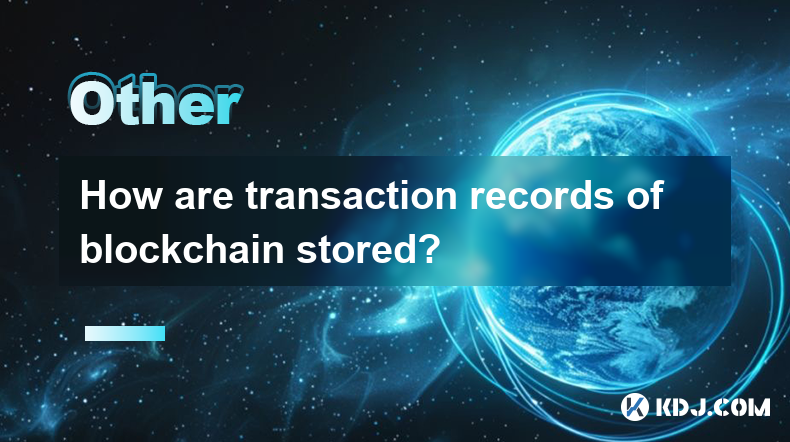
Understanding Blockchain's Data Structure
Blockchain technology relies on a distributed ledger system, meaning transaction records aren't stored in a single location. Instead, they are replicated across numerous computers (nodes) in a network. This decentralized nature is crucial for security and transparency. Each transaction is bundled into a "block," which is then added to the existing chain of blocks, hence the name "blockchain."
The Role of Blocks in Storing Transactions
A block isn't just a random collection of data. It contains a specific structure. This structure typically includes:
- Transaction data: This is the core information—who sent what, to whom, and how much. The exact format varies slightly depending on the blockchain, but the essence remains the same.
- Hash of the previous block: This is a unique cryptographic fingerprint of the preceding block in the chain. This linking ensures the integrity of the chain; altering a single transaction would change the hash, making the alteration immediately apparent.
- Timestamp: This records when the block was created, adding a chronological element to the chain.
- Merkle root: This is a cryptographic hash of all the transactions within the block, providing a concise summary of the block's contents. This allows for efficient verification of individual transactions without needing to access the entire block.
This structured approach ensures data integrity and makes it extremely difficult to alter past transactions.
The Process of Adding a New Block
The process of adding a new block to the blockchain involves several steps:
- Transaction Broadcasting: When a transaction occurs, it's broadcast to the network of nodes.
- Transaction Verification: Nodes validate the transaction, checking for things like sufficient funds and correct signatures.
- Block Creation: Once a sufficient number of transactions are gathered (this number varies depending on the blockchain), a miner (or validator in some blockchains) begins to create a new block.
- Proof-of-Work/Proof-of-Stake: The miner solves a complex cryptographic puzzle (Proof-of-Work) or is selected based on their stake (Proof-of-Stake) to add the block to the chain.
- Block Propagation: Once the block is successfully added, it's propagated across the network, ensuring all nodes have an identical copy of the updated blockchain.
This process, while seemingly complex, ensures that the addition of new blocks is secure and transparent.
Data Immutability and Security
The cryptographic hashing and the distributed nature of the blockchain make it extremely difficult to tamper with existing transaction records. Any attempt to alter a past transaction would require altering all subsequent blocks, which is computationally infeasible given the vast network of nodes. This inherent immutability is a cornerstone of blockchain's security.
Different Blockchain Architectures and Storage
It's important to note that different blockchains may have variations in their storage mechanisms. Some might employ different hashing algorithms or consensus mechanisms. However, the fundamental principle of storing transaction data in blocks linked cryptographically remains consistent. Furthermore, the physical storage location of the blockchain data varies. It can be distributed across numerous servers, hard drives, or even cloud storage, depending on the specific implementation.
The Importance of Data Integrity and Transparency
The way blockchain stores transaction records is intrinsically linked to its security and transparency. The immutability of the data ensures that once a transaction is recorded, it cannot be easily altered or deleted. The transparency, enabled by the public nature of most blockchains, allows anyone to view the transaction history. This combination of features makes blockchain a powerful technology with a wide range of potential applications.
How Blockchain Handles Large Datasets
As the blockchain grows, the size of the data stored increases significantly. To manage this, various techniques are used. Some blockchains employ techniques like pruning (removing old blocks) or using sharding (splitting the blockchain into smaller, more manageable parts). These methods help maintain efficiency without compromising data integrity.
Frequently Asked Questions
Q: Is all blockchain data publicly accessible?
A: Most public blockchains have a transparent ledger, meaning transaction data is publicly accessible. However, some blockchains offer privacy features that obscure specific details while maintaining the overall integrity of the chain. The level of accessibility depends on the specific blockchain's design.
Q: How is data redundancy ensured in a blockchain?
A: Data redundancy is achieved through replication. The blockchain is replicated across numerous nodes in the network. If one node fails, others continue to hold a copy of the data, ensuring its availability and preventing single points of failure. This redundancy is critical for the resilience and security of the blockchain.
Q: Can transaction data on a blockchain ever be deleted?
A: No, once a transaction is added to a blockchain, it is virtually impossible to delete it. The cryptographic linking of blocks and the distributed nature of the system make deletion practically infeasible. While some blockchains might employ pruning techniques to remove old blocks, this does not involve deleting the data itself, but rather making it inaccessible through the standard chain traversal.
Q: How does blockchain ensure the authenticity of transactions?
A: Authenticity is ensured through cryptographic signatures. Each transaction is digitally signed by the sender, proving their ownership and authorization. These signatures are verified by the nodes in the network, confirming the legitimacy of the transaction. The cryptographic hashing further ensures that any alteration to the transaction would be immediately detectable.
Q: What are the limitations of blockchain storage?
A: While blockchain offers significant advantages, it also has limitations. The scalability of some blockchains can be a challenge, particularly when dealing with a large number of transactions. The storage requirements can also be substantial, requiring significant resources to maintain a complete copy of the blockchain. Furthermore, the immutability of data, while a strength in many contexts, can also be a limitation if errors or fraudulent transactions are inadvertently included in the chain. Finally, the energy consumption of some consensus mechanisms (like Proof-of-Work) is a significant concern.
Disclaimer:info@kdj.com
The information provided is not trading advice. kdj.com does not assume any responsibility for any investments made based on the information provided in this article. Cryptocurrencies are highly volatile and it is highly recommended that you invest with caution after thorough research!
If you believe that the content used on this website infringes your copyright, please contact us immediately (info@kdj.com) and we will delete it promptly.
- Gold Exempt From New "Reciprocal" Tariffs
- 2025-04-04 06:35:12
- Time to Buy Aptos (APT) Cheap? This Chart Pattern Signals a 10% Move for the Price!
- 2025-04-04 06:35:12
- An Analyst Has Explained How Dogecoin Could Be at a Make-or-Break Level Right Now Based on a TA Chart Pattern
- 2025-04-04 06:30:12
- Micro Intelligence Company Strategy Has Purchased 22,048 Bitcoins Worth $1.92 Billion in a New Deal
- 2025-04-04 06:30:12
- BlockDAG's Beta Testnet Is Live— Aims to Achieve 15K TPS! Ethereum Price Falls 0.5% & ETC Dips 6.7%
- 2025-04-04 06:25:12
- title: New decentralized finance (DeFi) trading altcoin is surging after gaining support from the top US-based crypto exchange platform by volume
- 2025-04-04 06:25:12
Related knowledge

What are the future development trends of blockchain game development?
Apr 03,2025 at 05:00am
Blockchain technology has revolutionized various industries, and gaming is no exception. As we look to the future, several trends are set to shape the development of blockchain games. These trends not only promise to enhance the gaming experience but also to integrate blockchain technology more seamlessly into the gaming ecosystem. Let's explore these t...

What are the maintenance costs of blockchain system development?
Apr 03,2025 at 06:07pm
The maintenance costs of blockchain system development are multifaceted and depend on various factors. These costs can include technical maintenance, security updates, infrastructure expenses, and personnel costs. Understanding these elements is crucial for anyone planning to develop or maintain a blockchain system. Technical MaintenanceTechnical mainte...
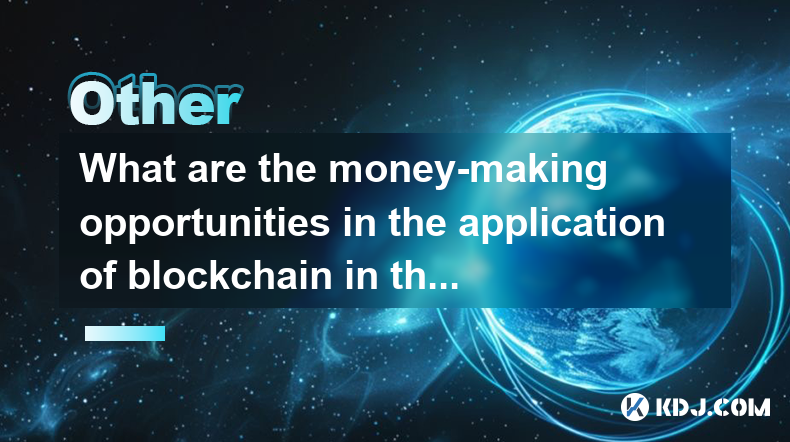
What are the money-making opportunities in the application of blockchain in the medical industry?
Apr 03,2025 at 03:35am
The integration of blockchain technology into the medical industry presents a myriad of money-making opportunities that can revolutionize healthcare systems. Blockchain's inherent characteristics, such as transparency, security, and immutability, make it an ideal solution for various medical applications. By leveraging blockchain, companies can develop ...
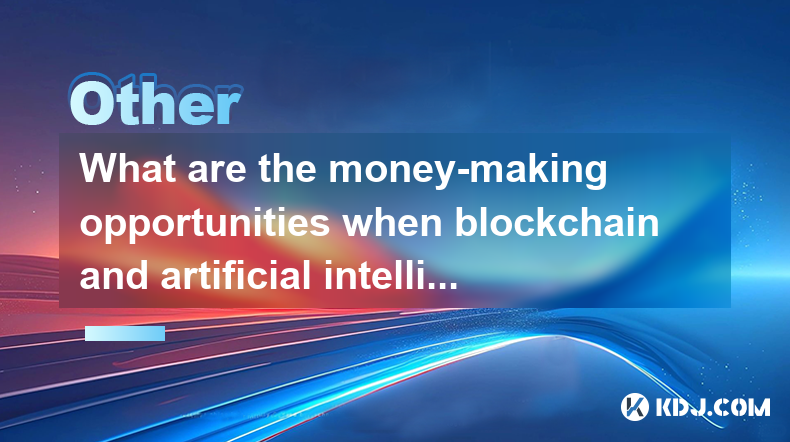
What are the money-making opportunities when blockchain and artificial intelligence are combined?
Apr 04,2025 at 01:28am
The convergence of blockchain and artificial intelligence (AI) presents a myriad of money-making opportunities within the cryptocurrency circle. This fusion leverages the decentralized and secure nature of blockchain with the analytical prowess of AI, creating innovative solutions and platforms that can generate significant revenue. From enhancing tradi...
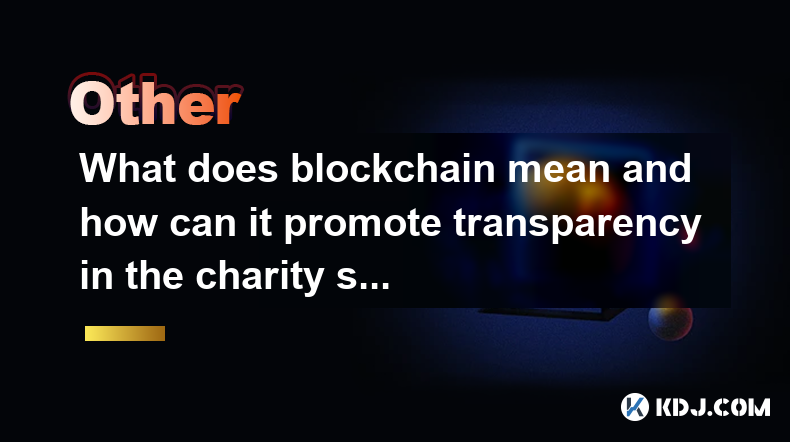
What does blockchain mean and how can it promote transparency in the charity sector?
Apr 03,2025 at 08:29pm
Blockchain technology is a decentralized, distributed ledger that records transactions across numerous computers. This ensures that the data is transparent and nearly impossible to alter retroactively. Essentially, blockchain serves as a digital ledger of all cryptocurrency transactions, enabling secure and direct exchanges without the need for intermed...
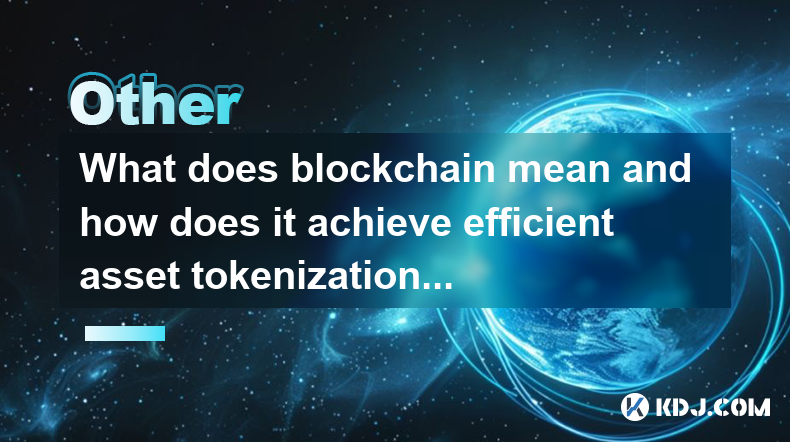
What does blockchain mean and how does it achieve efficient asset tokenization?
Apr 03,2025 at 07:57pm
Blockchain technology is a decentralized, distributed ledger that records transactions across numerous computers. It ensures that each transaction is secure, transparent, and immutable. The concept of blockchain was introduced with the launch of Bitcoin in 2009, but its applications have since expanded far beyond cryptocurrencies. At its core, blockchai...

What are the future development trends of blockchain game development?
Apr 03,2025 at 05:00am
Blockchain technology has revolutionized various industries, and gaming is no exception. As we look to the future, several trends are set to shape the development of blockchain games. These trends not only promise to enhance the gaming experience but also to integrate blockchain technology more seamlessly into the gaming ecosystem. Let's explore these t...

What are the maintenance costs of blockchain system development?
Apr 03,2025 at 06:07pm
The maintenance costs of blockchain system development are multifaceted and depend on various factors. These costs can include technical maintenance, security updates, infrastructure expenses, and personnel costs. Understanding these elements is crucial for anyone planning to develop or maintain a blockchain system. Technical MaintenanceTechnical mainte...

What are the money-making opportunities in the application of blockchain in the medical industry?
Apr 03,2025 at 03:35am
The integration of blockchain technology into the medical industry presents a myriad of money-making opportunities that can revolutionize healthcare systems. Blockchain's inherent characteristics, such as transparency, security, and immutability, make it an ideal solution for various medical applications. By leveraging blockchain, companies can develop ...

What are the money-making opportunities when blockchain and artificial intelligence are combined?
Apr 04,2025 at 01:28am
The convergence of blockchain and artificial intelligence (AI) presents a myriad of money-making opportunities within the cryptocurrency circle. This fusion leverages the decentralized and secure nature of blockchain with the analytical prowess of AI, creating innovative solutions and platforms that can generate significant revenue. From enhancing tradi...

What does blockchain mean and how can it promote transparency in the charity sector?
Apr 03,2025 at 08:29pm
Blockchain technology is a decentralized, distributed ledger that records transactions across numerous computers. This ensures that the data is transparent and nearly impossible to alter retroactively. Essentially, blockchain serves as a digital ledger of all cryptocurrency transactions, enabling secure and direct exchanges without the need for intermed...

What does blockchain mean and how does it achieve efficient asset tokenization?
Apr 03,2025 at 07:57pm
Blockchain technology is a decentralized, distributed ledger that records transactions across numerous computers. It ensures that each transaction is secure, transparent, and immutable. The concept of blockchain was introduced with the launch of Bitcoin in 2009, but its applications have since expanded far beyond cryptocurrencies. At its core, blockchai...
See all articles






















































































